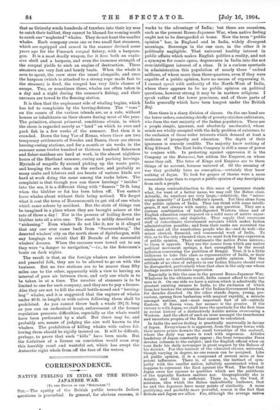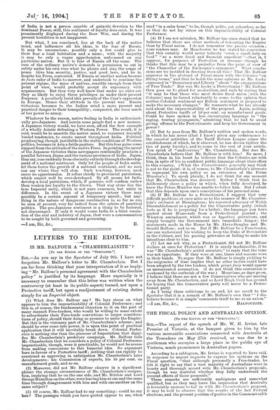NATIVE FEELING IN INDIA ON THE RUSSO- JAPANESE WAR. [To
THE EDITOR OF THE "SPECTATOR...1 Sin,—The apathy of the British public towards Indian questions is proverbial. In general, for obvious reasons, it
works to the advantage of India ; but there , are occasions, such as the present Russo-Japanese War, when native feeling ought not to be disregarded at home. Now the term "public opinion" has, in England and in India, widely divergent
meanings. Sovereign in the one case, in the other it is politically negligible. That universal healthy interest in public affairs which makes English politics a reality, and not a. synonym for comic opera, degenerates in India into the not over-intelligent interest of a class. It is a curious spectacle in administration this population of nearly three ' undred millions, of whom more than three-quarters, even if they were capable of a public opinion, have no means of expressing it. I cannot speak with authority of the North-West of India, where there appears to be no public opinion on political questions, however strong it may be in matters religious. I speak rather of the lower provinces, and of those parts of India generally which have been longest under the British _Raj.
Here there is a sharp division of classes. On the one hand are the lower orders, consisting chiefly of poverty-stricken cultivators, who form the vast majority of the Indian population. These are a people simple, ignorant, and absolutely uneducated, whose minds are wholly occupied with the daily problem of existence, to
the exclusion of those wider interests which demand at least a modicum of 'prosperity and education. The depth of their ignorance is scarcely credible. The majority know nothing of King Edward. The East India Company is still a name of power to conjure with. In protesting against oppression it is the Company or the Maharani, but seldom the Emperor, on whose name they call. The fates of Kings and Empires are to them things of no account, because unheard of. Of the meaning of war they probably have no conceptiou,—certainly they know nothing of Japan. To look for grapes of thorns were a more reasonable hope than to expect a public opinion of any description from such a people.
In sharp contradistinction to this mass of ignorance stands what, for want of a better name, we may call the Baboo class. Actually, its numbers are very large,—relatively, the " micro- scopic minority" of Lord Dufferin's speech. Yet they alone form the public opinion of India. They can think with some intelli- gence, if not always with sanity, on any question. They are a curious combination of half-digested Western ideas and of English education superimposed on a solid mass of native super- stition, ignorance, and duplicity. They supply that enormous staff of subordinate Government servants which makes Indian administration possible ; and from their ranks are recruited the clerks and all the numberless people who do—and do well—the minor clerical, financial, and commercial work of India. To this, as to the only educated class, we must look for any expression of public opinion. Their sentiments the native Press mirrors ; to them it appeals. They are the source from which any native political movement springs, a fact exemplified by the recent agitation concerning the partition of Bengal. True, it is a little ludicrous to take this class as representative of India, or their sentiments as constituting a serious public opinion. But the attitude of no class of subjects in our Indian Empire should ever be disregarded, particularly when that class is the only one whose feelings receive articulate expression.
Especially is this the case in the present Russo-Japanese War. Whatever be the ultimate result, India cannot afford to shut her eyes to it. On one side we have a nation which is admittedly the greatest existing menace to India, to the exclusion of which from her borders the attention of the Indian Government has been for decades directed. On the other stands Japan, young, pre- cocious, sprung from barbarism with magical rapidity, a miracle amongst nations, and—most important fact of all—entirely Eastern. If Russia wins, her menace is the greater. If the victory is with Japan, we shall have the spectacle for the first time in recent history of a distinctively Asiatic nation overcoming a Western. And the effect of such an issue amongst the treacherous and uncertain peoples of the East cannot be calculated.
In India the native feeling is practically universally in favour of Japan. Everywhere it is apparent, from the larger towns with their native prints down to the small townships of the mofussil, where the daily war news is read with eagerness. Articles laudatory of Japan constantly appear ; the local vernacular Press devotes columns to the subject; and the English official when on tour finds his daily newspaper in great request by the Baboos of his district. For this interest of the educated classes, universal, though varying in degree, no one reason can be assigned. Like all public opinion, it is a compound of several more or less potent influences. There is, of course, the instinct of sym- pathy with the smaller nation, infinitely accentuated when it happens to represent the East against the West. The fact that Japan owes her success to qualities which are the antithesis of the typically Eastern matters not. Geographically she is Asiatic, and that is sufficient. There is, too, the fond, if mistaken, idea which the Baboo undoubtedly harbours, that he and the Japanese have many points of similarity. A more gratifying, and probably more powerful, reason is the fact that Britain and Japan are allies. For, although the average native of India is not a person capable of quixotic devotion to the dominant Power, still, this sentiment of loyalty does exist. It was prominently displayed during the Boer War, and during the present hostilities is not inapparent.
But what, I am convinced, lies at the back of the native mind, and influences all his ideas, is the fear of Russia. It may be unconscious ; possibly only a few could give to their fear a local habitation and a name ; with the majority it may be only a vague apprehension unfocussed on any particular nation. But it is fear of Russia all the same. The sum of the ordinary native's demands is permission to eat in safety under his own vine what he plants and sing the songs of peace. Give him security, justice, and good laws, and he is, despite his Press, contented. If Russia or another nation became de facto ruler of India to-morrow, and undertook to continue the present regime, the mass of natives, sensibly enough from their point of view, would probably accept its supremacy with acquiescence. But they very well know that under no ruler are they so likely to enjoy these privileges as under their present Emperor. A peculiarly lurid idea prevails of the Czar's oppression in Europe. Hence their attitude in the present war. Russia victorious becomes to the Indian mind a more present and practical danger to their tranquillity ; conquered, she loses much of her power to annoy.
Whatever be the reason, native feeling in India is enthusiasti- cally pro-Japanese. And herein some people find a new menace. A Japanese victory would, we have seen, afford the first example of a wholly Asiatic defeating a Western Power. The result, it is said, would be to unsettle the native mind, to resurrect decently buried tendencies, to create unrest throughout India. Political prophesying, though justifiable in the stable conditions of Western politics, becomes in Asia a futile pastime. But this fear gains some support from the attitude of the native Press. In pointing the moral of the Japanese victories these newspapers continually proclaim a parallel between Japan and the various provinces of India. Japan, they say, rose suddenly from obscurity entirely through the develop- ment of a national sentiment. Only let the people of India unite, let them foster the growth of a national sentiment, and no man can say where they will stop. Such teaching, however, need cause no apprehension. It refers chiefly to provincial patriotism, which cannot well be over-developed. By all means let India develop a local patriotism, which, if genuine, will confirm rather than weaken her loyalty to the Crown. That way alone lies the true Imperial unity, which is not pure sameness, but unity in difference. In the event of a Japanese victory there may possibly be a certain amount of temporary unrest ; but any- thing in the nature of dangerous combination is, so far as can be seen at present, very far indeed from the sphere of practical politics. The pro-Japanese sentiment is a thing to be fostered, not discouraged. If only it would rouse India to a faint emula- tion of the zeal and industry of Japan, that were a consummation to be sought by both governed and governing.
am, Sir, &c., B.



































 Previous page
Previous page